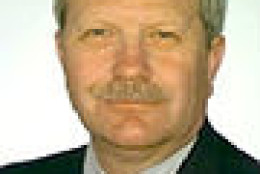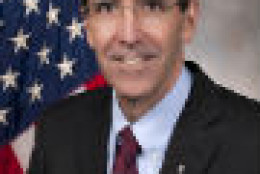Defense Department
-
Realignment won't change overall U.S. presence in Europe, but will close several facilities and add more than 1,000 personnel to support the new F-35.
January 09, 2015 -
The Defense Department is likely to push for another round of Base Realignment and Closure in fiscal 2016, even though Congress has shot down the idea more than once. But there are no legal restrictions on closing bases overseas. Federal News Radio's Jared Serbu reports, DoD is moving forward to do just that.
January 08, 2015 -
Republican leadership in the House of Representatives is finalizing the new leaders of the House Appropriations Committee. Bloomberg reports today it names staff for the Defense Appropriations subcommittee, the Energy and Water subcommittee, and the Military Construction and Veterans Affairs subcommittee. As the new Congress takes shape, those leaders will prioritize spending for federal IT. Mark Forman is vice president for IT services and cloud at The Analytic Sciences Corporation (TASC) and he was the first e-gov administrator of the United States. On In Depth with Francis Rose, he shared a Federal IT wish list for the new Congress.
January 08, 2015 -
Critics of the Navy's maritime strategy -- or lack thereof -- are all over the federal defense community. One retired officer tells the U.S. Naval Institute the defense community may not understand what the word "strategy" means anymore. Congressman Randy Forbes has an open letter to chief of naval operations, Adm. Jonathan Greenert, asking him to lead an effort to restore strategic planning to the Navy. Barney Rubel is former dean of the Center for Naval Warfare Studies at the U.S. Naval War College. On In Depth with Francis Rose, he said those critics are missing an important piece of the strategy puzzle.
January 08, 2015 -
We've gone through the first 400 bills in the new Congress to pull out those you'll want to watch, from a measure to kick political appointees out of the Federal Employees Health Benefits Plan to three that embrace across-the-board spending cuts.
January 08, 2015 -
As the 114th Congress convenes this week, leaders on both sides of the Hill say budget issues will be priorities. Leaders at the Defense Department are already campaigning against sequestration, and the budget will likely be a big part of the discussion at Ashton Carter's confirmation hearing next month. Dov Zakheim is a Senior Advisor at the Center for Strategic and International Studies, and former Comptroller of the Department of Defense. He's also a member of the Military Compensation and Retirement Modernization Commission. On In Depth with Francis Rose, he said DoD getting in front of the sequester problem is the right strategy.
January 07, 2015 -
The budget will be one of the first things the new Congress takes up, according to leadership on both sides of Capitol Hill. The Defense Department is already starting its push to end -- or at least cut back on -- sequestration. James Jay Carafano is director of the Davis Institute for International Studies at the Heritage Foundation. He shared his Top 3 for 2015 on In Depth with Francis Rose. He says he thinks Congress will do a real defense budget in 2015, but that doesn't mean sequestration will go away.
January 06, 2015 -
Troops start the new year with a 1 percent pay raise. That's a little less than the 1.8 percent raise they would have gotten automatically from the annual cost of living adjustment. A study on pay and benefits from the Military Compensation and Retirement Modernization Commission is due next month. Vice Adm. Norb Ryan is president of the Military Officers Association of America. He says some kind of reform is long overdue. He shared his Top 3 for 2015 on In Depth with Francis Rose. He says morale is still a top priority for the military, even with fewer commitments in Afghanistan.
January 06, 2015 -
The all volunteer force has made it easier to deploy forces around the world, according to some military policy experts. No one is proposing bringing back the draft, but downsizing may create an opportunity to take a new look at how the military is structured. Retired U.S. Navy Adm. John Harvey is Secretary of Veterans and Defense Affairs for the Commonwealth of Virginia. He's the former Commander of U.S. Fleet Forces Command. He shared his Top 3 for 2015 on In Depth with Francis Rose. He said there are two big pieces to consider.
January 05, 2015 -
New Office of Personnel Management clarifies statutory language affecting who is eligible to receive veterans preference during the hiring process at federal agencies.
January 02, 2015 -
The Pentagon announces more successful air strikes against the Islamic State militants in Iraq and Syria. The new year hasn't brought a new policy in dealing with the Islamic State, but more American advisers are on the ground in Iraq. And 2015 may be the year that calls for more of an American military presence in both countries to get louder. Steve Bucci is Director of the Allison Center for Foreign and National Security Policy at the Heritage Foundation. He's former Deputy Assistant Secretary of Defense, and a retired Army Special Forces officer. He shared his Top 3 for 2015 on In Depth with Francis Rose. He said decisions the enemy makes may force the hand of the United States.
January 02, 2015 -
The House Armed Services Committee and leaders within industry and Pentagon are making it clear defense acquisition rules need some work. And new Congressional leaders might bring new attitudes on acquisition that could reverse current trends. Larry Allen is president of Allen Federal Business Partners. On In Depth with Francis Rose, he shared his Top 3 for 2015, and told Federal News Radio's Nicole Ogrysko 2015 is an important year for acquisition reform and the General Services Administration. He's optimistic about the future of procurement in 2015, but a look into his Magic 8 Ball said "The future is still unclear; ask again later."
January 02, 2015 -
A new program through the Uniformed Services University of the Health Sciences' F. Edward Hébert School of Medicine will give men and women in the enlisted ranks of the military two years of undergraduate-level science coursework meant to prepare them for the rigorous Medical College Admission Test (MCATs).
January 02, 2015 -
Enlisted Navy and Marine Corps service members have a new, easier route to medical school. It's called the Enlisted-to-Medical Degree Preparatory Program. It puts them on equal footing with counterparts in the Army and Air Force. Dr. Art Kellermann is Dean of the F. Edward Hébert School of Medicine at the Uniformed Services University of the Health Sciences. He joined the Federal Drive with Tom Temin to explain how the new program works.
January 02, 2015 -
A Government Accountability Office report says the Defense Department needs to close a gap in interagency communications to reduce the risk of foreign observation of its testing facilities.
January 01, 2015











